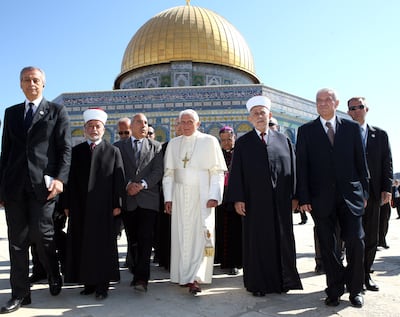The former Pope Benedict XVI has died aged 95. Joseph Alois Ratzinger in February 2013 became the first pope to resign since 1415 but during his papacy, widely regarded as a difficult tenure, he was confronted with secularism, a dwindling interest in Catholicism — reflected in declining church attendances — and a schism over the direction of the church. His leadership was scarred deeply by the ramifications of a scandal towards the end of the 20th century, when the Vatican’s handling of a plethora of clerical sexual abuse cases came under fire. He also faced allegations of being a Nazi sympathiser and took a firm stand in defending celibacy in the priesthood.
After taking office in 2005, the pontiff travelled extensively throughout Europe and to Brazil, the US, Australia, Cameroon, Angola and Turkey, where he sought to bridge the gap between the Eastern Orthodox and Roman Catholic churches. In May 2009, Pope Benedict arrived in Amman, Jordan, for a week-long tour of the region, also taking in Israel and Palestine.

In Jerusalem, he condemned Holocaust deniers, urged co-operation between Palestinians and Israelis and offered an iconic sculpture as a gift to the people of Bethlehem in the West Bank.
He met political and religious leaders on a three-day tour of Lebanon in 2012, during which he visited the settlements of Bzommar and Baabda. Describing himself as a "pilgrim of peace", the pontiff highlighted the need for deeper interfaith co-operation, particularly between Muslims and Christians.
Born in the south-west German market town of Marktl am Inn on April 16, 1927, Ratzinger’s parents were staunch Catholics and, when the Nazis came to power in 1933, were opposed to the regime.

Having entered theological school as the Second World War broke out, he was compelled to join the Hitler Youth two years later, under mandatory membership, then the military in 1943. He was posted to Hungary but deserted in April 1945, only to be held briefly as a prisoner of war by the Americans.
Post-war, his seminary education continued at pace. He was ordained in 1951 and received a doctorate in theology at the University of Munich. He taught at a school of philosophy and theology in Freising until 1959, later moving to the universities of Bonn, Muenster, Tuebingen and Regensburg, where he became vice president. His theological works drew an invitation to join the Second Vatican Council, where he was considered progressive and challenged ambitions to curtail reforms. But having settled on a more conservative outlook, Ratzinger was appointed archbishop of Munich and Freising by Paul VI.
In 1972, Ratzinger co-founded the journal Communio, considered one of the touchstones of Catholic thinking. As his status within the establishment gathered momentum, he continued to reaffirm what he held as vital elements of doctrine, such as birth control and inter-religious dialogue. He became a prefect and friend of his predecessor John Paul II, and went on to become his most trusted adviser, becoming instrumental in attempts to interact with other faiths, Islam and Judaism in particular. This long-standing service was later thought to have secured his election as Pope.

Ratzinger was elevated to the papacy on April 19, 2005, after the death of John Paul II. As the oldest newly elected pope since 1730, he sought to transform his perceived rigidity, vowing to rejuvenate the Catholic church in Europe but, at the same time, perpetuating his predecessor’s orthodoxy on sexuality, priestly celibacy and clerical matters.
In 2008, Benedict made his first papal visit to the US, where he gave a speech to the United Nations, championing human rights, and spoke out against sexual abuse in the priesthood. Later that year he addressed the inaugural Catholic-Muslim Forum, an assembly of church theologians and Islamic scholars. In 2010, allegations of abuse by parish priests and in religiously affiliated schools — including in his native Germany — put Benedict under extreme pressure. He was moved to reproach bishops in the Irish church on the matter: “It must be admitted that grave errors of judgment were made and failures of leadership occurred," he said. The Vatican rejected charges that Benedict had been responsible for the policy of covering up sexual abuse cases, stating that his guidance throughout the scandal demonstrated “wisdom and firmness”.
Ill health dogged his term of leadership and led ultimately to his surprise resignation in 2013, aged 85. Citing mobility issues and a marked deterioration in strength, he told gathered cardinals at the Vatican: "For this reason, and well aware of the seriousness of this act, with full freedom I declare that I renounce the ministry of Bishop of Rome, Successor of Saint Peter.” Benedict's announcement still shocked the world, however, and was said to have left some of his aides astonished — even members of his inner sanctum had been unaware of his intention to quit.

The sexual abuse scandal surrounding the church might forever cloud his papacy. Commissioned by the archdiocese in Munich, a report this year accused the retired pope of mishandling cases of abuse by priests when he was archbishop in the Bavarian city. He denied any wrongdoing yet pleaded for forgiveness. "All the greater is my pain for the abuses and the errors that occurred in those different places during the time of my mandate,” he said in response to the findings.
“I have come to understand that we ourselves are drawn into this grievous fault whenever we neglect it or fail to confront it with the necessary decisiveness and responsibility, as too often happened and continues to happen. Once again I can only express to all the victims of sexual abuse my profound shame, my deep sorrow and my heartfelt request for forgiveness.”
Upon retirement, he continued to be known as Benedict XVI and was bestowed the title of pope emeritus.





















